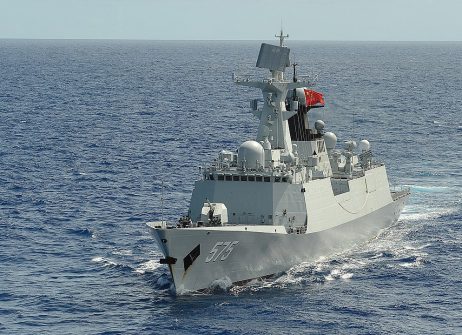
Russia, China and South Africa to Conduct Joint Naval Exercises
Publication: Eurasia Daily Monitor Volume: 20 Issue: 26
By:

From February 17 to 27, the navies of Russia, China and South Africa will conduct joint naval exercises in the Indian Ocean off the coast of Durban, the largest port in South Africa (Africanews.com, January 19). This marks the second time these governments have held joint exercises, the first being in 2019 (The Diplomat, November 22, 2019). Although those exercises were noteworthy at the time, little came of them. However, under the vastly changed geopolitical circumstances coming as a result of Russia’s all-out aggression against Ukraine, the potential ramifications of these upcoming exercises might be more far-reaching. For South Africa, which is a member of the BRICS economic bloc (loose grouping of Brazil, Russia, India, China and South Africa) with Russia and China, these exercises appear to be a way of declaring South Africa’s neutrality vis-à-vis Russia’s war. Despite its closeness with Russia and China, South Africa claims that it is merely doing what every state does—that is, carrying out exercises with friendly countries (Ntd.com, January 23). And since it remains neutral, the upcoming exercises do not signify that Pretoria is gravitating toward either Moscow or Beijing, as it also regularly conducts exercises with the United States, with four occurring since 2011 (Thestrategybridge.org, September 8, 2021).
But for Moscow and Beijing, the possible repercussions of these exercises go further, particularly in view of their strategic intimacy. It has now become a habit for these two navies to conduct exercises with third parties in the Indian Ocean, as they also conducted exercises with Iran, in addition to South Africa, in 2019 (see China Brief, January 17, 2020). Russia and China continued their relationship with Tehran in 2022, conducting two sets of exercises with the Iranian Navy—one, in January 2022, just before the start of Russia’s re-invasion of Ukraine and then again in the fall (Radio Free Europe/Radio Liberty, January 21, 2022; TASS, September 22, 2022). The exercises with Iran not only reflect the increasing alignment between Moscow and Tehran but also extend to what might be Russia’s growing alliance with China, which manifests itself through joint naval, air and land exercises targeting Japan and South Korea in Northeast Asia (Nikkei, November 30, 2022). It would be no small matter if Russia were to engage in more advanced forms of naval or other military cooperation with China in the Indian Ocean, an issue that would not only trigger considerable concern in Washington but also genuine alarm in New Delhi (Ndtv.com, September 23, 2022; The Diplomat, December 3, 2022). Such cooperation would dramatically affect security perspectives throughout the Indian Ocean region and mark major transformations for security in Asia.
The impact of Moscow and Beijing’s cooperation in the Indian Ocean could reverberate beyond Asia, however, as China and Russia maintain a major and growing presence across Africa. Consequently, any sign of growing bilateral cooperation, whether militarily or in other domains, would have comparable effects across the continent. In the words of one analyst, “While Russian moves have little chance of competing effectively against Chinese initiatives, they have the potential to complement them” (Theasiadialogue.com, June 26, 2019). Nevertheless, for the moment, substantive bilateral Russian-Chinese cooperation in Africa has yet to appear, particularly regarding security issues.
However, this does not mean that the West should dismiss the two governments’ African policies. The impending trilateral exercises should be seen in the context of Russia’s stepped up and long-running campaign to enhance its presence and influence both in Africa and the Indian Ocean. While the Kremlin’s influence campaign in Africa has received more recent attention due to its war against Ukraine, its increasing interest in establishing an enduring naval presence in the Indian Ocean merits more scrutiny. Russia’s campaign for permanent naval bases in the Horn of Africa, Indian Ocean and the Red Sea dates back to the Soviet Union under Leonid Brezhnev, resumed in the late 2000s and have been continuing ever since (Meed.com, January 16, 2009). As a result, by the time the Kremlin proposed its 2015 Maritime Doctrine, the Indian Ocean had become a “priority” for the Russian Navy (Cntd.ru, July 26, 2015; see EDM, October 19, 2022).
Since then, Russia has embarked on serious ongoing efforts to secure influence and naval bases in Sudan and along the Horn of Africa. These efforts include information warfare on behalf of autocratic governments, arms sales, security training, education of officers and civilians in Russia, as well as diplomatic support in the United Nations (Al Jazeera. March 18, 2022; Nikkei, August 9, 2022). Additionally, Moscow is employing the same tactics in Myanmar (Korabel.ru, January 22, 2018; Middle East Eye, September 30, 2022). Thus, in the new 2022 Maritime Doctrine, the critical nature of the Indian Ocean has been reiterated as one of the main regional directions for the Russian Navy (Kremlin.ru, July 31, 2022).
Keeping in mind the developments in Ukraine, in comparison with 2019, the stakes for Russia are greater, as its isolation from most of Europe has compelled Moscow to pursue a global policy with severely constrained resources, not least in Africa and around the Indian Ocean (see EDM, January 30). China, too, is pursuing a global policy in both theaters, albeit with many more resources. Thus, the possibility for cooperation is much greater, with highly consequential benefits coming from any bilateral coordination. Whether Moscow’s unrelenting pursuit for global influence and military presence will bear fruit in terms of cooperation remains to be seen, but regardless, its efforts will present serious challenges for Western, Asian and African policymakers.



